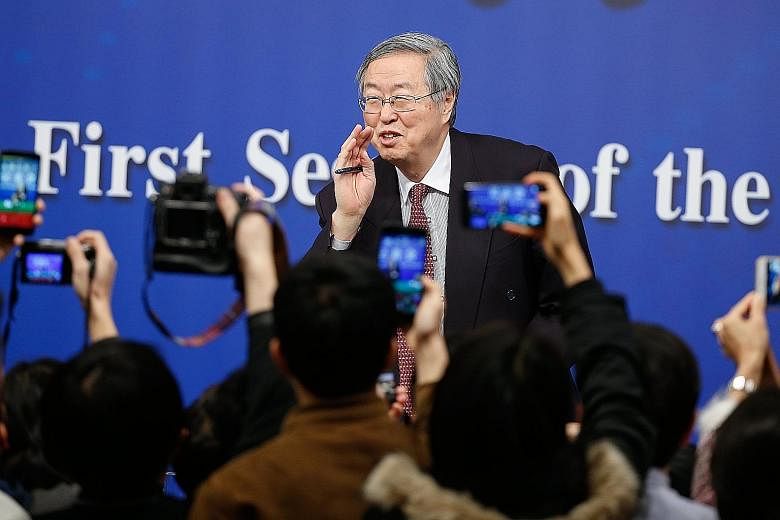China can be "bolder" in granting wider market access and further open up its economy as it enters a new stage of development, the country's central banker said yesterday.
As the world's No. 2 economy seeks quality development, it will rely less on stimulus to boost growth, Mr Zhou Xiaochuan, governor of the People's Bank of China (PBOC), told a briefing on the sidelines of the annual parliamentary session.
"We now emphasise the new normal of the economy, shifting from the past model of quantitative growth... where we depend on the accumulation of capital and investment to stimulate economic growth," said 70-year-old Mr Zhou, who is expected to retire this month.
"While pursuing higher quality growth, we are likely to reduce our reliance on the old growth model of investment."
Mr Zhou said there are clear signs that China has stabilised and is gradually reducing its its debt levels, referring to its high debt ratios which global observers have flagged as potential risks to the economy.
He noted that the National People's Congress will discuss financial regulatory system reforms during the last few days of the session.
Overall, the PBOC will play a more important role in the regulatory framework, as a new Cabinet-level body overseeing financial stability and development has been installed at the central bank, he said.
-
China in no rush to develop a digital currency
-
China is in no hurry to develop a digital currency, though it may one day render physical money obsolete, People's Bank of China governor Zhou Xiaochuan said yesterday.
While cryptocurrencies could help to deliver more convenient, faster and cheaper payment methods, the development of virtual money should be a prudent process and avoid excessive speculation, he warned.
"Cryptocurrencies such as bitcoin have seen explosive growth, which could bring significant negative impact on consumers," he said.
"We don't like creating products that could be used for speculation, giving people the illusion that they can get rich overnight."
China banned initial coin offerings and shut down its domestic cryptocurrency exchanges last year.
State media has reported that more regulations are in the works to further tighten the market.
"The trading of virtual assets is not in line with China's direction that the financial sector must serve the real economy," he added.
Mr Zhou acknowledged that blockchain development and other technologies related to digital currency could bring benefits to consumers and the retail market.
But for a big economy like China, "we must prevent major mistakes that would lead to irreparable losses, so we are cautious," he said.
"In the process we must conduct thorough testing to ensure its reliability before rolling out."
The bank will "take the lead" in strengthening coordination among financial institutions, especially the regulators, to increase efficiency.
It will also work to close gaps in the financial regulatory system "as soon as possible", address flaws in regulations, and speed up how it deals with problematic financial and quasi-financial organisations.
Mr Zhou, who is China's longest-serving central banker, was also asked about highlights of his 15-year stint. "I've spent so many years working in the financial system and many things have happened," he said.
"It is an honour to work with everyone on advancing financial reforms and opening up."
On March 19, lawmakers will vote to appoint a new central bank chief, who will lead further reforms in the financial sector. Chinese President Xi Jinping's top economic policy adviser, Mr Liu He, has been widely tipped as a front runner for the job.
Mr Zhou said "internationalising" the Chinese currency will be a gradual process, despite all the related policies being in place, as it depends on the willingness of market players to switch to using the yuan in trade and investment settlements, as well as commodity pricing.
On the part of the central bank, it will strive to strengthen the connectivity of the Chinese capital and financial markets with other markets in the world. China will also work to lift restrictions on the capital account "steadily and gradually", which will help step up yuan internationalisation.
PBOC deputy governor Yi Gang said China will eventually have a "two-way" opening up of its stocks, bonds and other financial markets.
"As we open up our markets, it is important to control risks. Our regulatory level must match the level of openness," he said.


